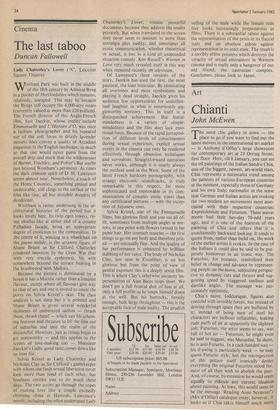Cinema
The last taboo
Duncan FaHowell
Lady Chatterley's Lover ('X', Leicester Square Theatre) Wrotham Park was built in the middle of the 18th century by Admiral Byng in a pocket of Hertfordshire which remains, relatively, unraped. This may be because the Byngs still occupy the 4,000-acre estate (currently valued at more than £20 million). The French director of this Anglo-French film, Just Jaeckin, whose credits include Emmanuelle and L'Histoire d'O, was once a fashion photographer and his repeated use of the soft focus in drizzly lavender sunsets does convey a quality of Arcadian paganism in the English landscape, so much so that one would never guess from the overall drip and murk that the wildernesses of Barnet, Finchley, and Potter's Bar seethe just beyond Wrotham's perimeter. At times the dark crimson spirit of D. H. Lawrence seems almost near. Nonetheless, a touch of the Home Counties, something genteel and undesirable, still clings to the surface of the film like tiny, all but invisible droplets of deodorant.
Wrotham is rather undersung in the ar- chitectural histories of the period but it looks lovely here. Its twin ogee towers, ris- ing phallus-like at either end of a creamy Palladian facade, bring an appropriate degree of exoticism to the composition. In the centre of it, wincing in a wheelchair on the piano nobile, is the scrawny figure of Shane Briant as Sir Clifford Chatterley rendered impotent by the Great War (but with very erectile eyebrows), his wife somewhere beyond the terrace heaving in the brushwood with Mellors.
Because the picture is dominated by a house it has a Marxist rather than a feminist flavour, except where all flavours give way to that of sex and one is invited to count the pores on Sylvia Kristel's skin. The class analysis is not deep but it is pointed and Shane Briant is given several wonderful moments of embittered sadism — thrash them, thrash them! — which suit his schem- ing features and threaten to lift the film out of suburbia and into the realm of the distasteful. However, just as things begin to get noteworthy — and this applies to the scenes of love-making too — Monsieur Jaeckin's Gallic good taste comes down like an iron fist. - Sylvia Kristel as Lady Chatterley and Nicholas Clay as Sir Clifford's gamekeeper with whom she finds sexual liberation never look more than fond of each other, but fondness entitles you to do much these days. The two actors go through the ropes of making love like a couple excitedly choosing china at Harrods. Lawrence's novels, including the often underrated Lady
Chatterley's Lover, remain powerful documents because they address the reader privately. But when translated to the screen they never seem to amount to more than nostalgia plus nudity; and sometimes all erotic communication, whether theoretical or actual, is lost in a kind of unintended situation comedy. Ken Russell's Women in Love very much revealed itself in this way when repeated recently on television.
Of Lawrencc's three versions of the story, Jaeckin has used the first, the most pastoral, the least testicular. By eliminating all overtones and most symbolisms and playing it dead straight, Jaeckin gives his audience few opportunities for unauthor- ised laughter in what is notoriously gig- gleworthy territory. This in itself is a distinguished achievement. But literal- mindedness is a variety of simple- mindedness and the film does lack emo- tional force. Because of the rapid juxtaposi- tion of different levels of consciousness during sexual experience, explicit sexual events in the cinema can only be rendered effectively through obsession techniques and surrealism. Straightforward narration never works, although it is nearly always the method used in the West. Some of the latest French hardcore pornography, with strange electronic soundtracks, is truly remarkable in this respect, far more sophisticated and memorable in its com- munication of complex erotic states than any certificated pictures — with the excep- tion of Japanese ones.
Sylvia Kristel, star of the Emmanuelle films, has glorious flesh and you see all of- fit, sometimes from multiple angles in mir- rors, at one point with flowers twined in her pubic hair. Her stomach muscles — the first things to go on any body and therefore priz- ed — are unusually fine. And the quality of her performance is enhanced by brilliant dubbing of her voice. The body of Nicholas Clay, last seen in Excalibur, is no less glorious but from the point of view of genital exposure this is a deeply sexist film. This is where Clay's otherwise uncanny im- personation of Alan Bates stops short. We don't get a full frontal shot of him at all, only a full profile as he soaps himself down at the well. But his buttocks, funnily enough, bulk large throughout — this is the acceptable face of male nudity. The prudish veiling of the male while the female runs free looks increasingly preposterous in films. There is a substantial taboo against the representation of the penis in its flaccid state and an absolute taboo against representation in its erect state. The result is a terribly effete posiness which destroys the veracity of sexual encounters in Western cinema and is really only a hangover of our old friend, the castration complex. Gentlemen, please look to Japan.


































 Previous page
Previous page